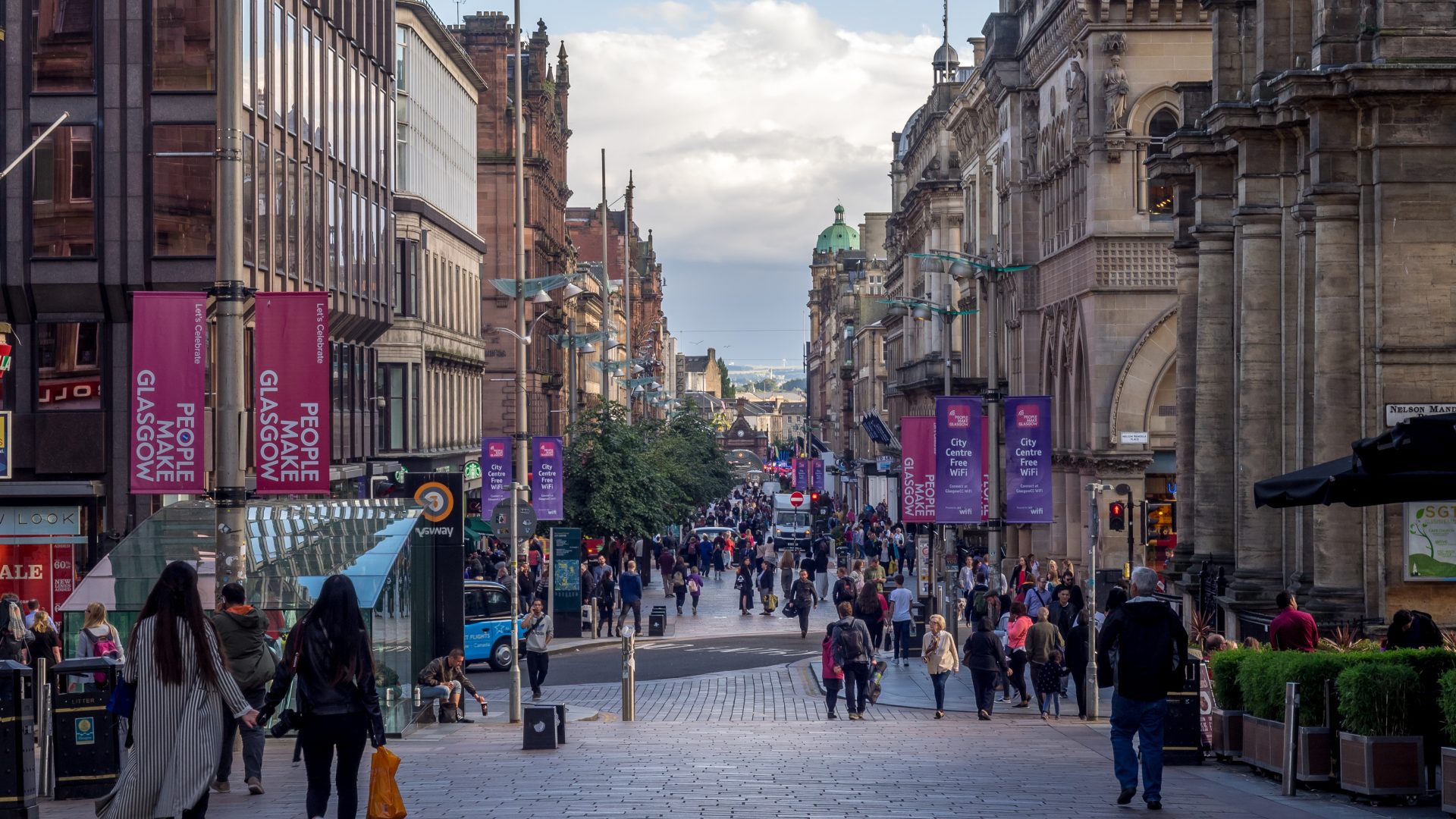

Now in its third year, Life in the UK is beginning to offer a longer-term story of what life is like for people in the UK and in each of its devolved jurisdictions. In Scotland, there are signs of hope across multiple domains, although there remain wide inequalities.
- Democracy
- Economy
- Environment
- Evidence and reports
- Inequality
- Measuring wellbeing
- Society
- Carnegie UK
- 2 November 2025
- ISBN: 9978-1-917536-05-9
- 13 minute read
Collective wellbeing in Scotland 2025
The overall score for collective wellbeing in Scotland in 2025 is 63 out of a possible 100. This is a statistically significant two-point increase in the score since 2023, and people in Scotland now have a higher collective wellbeing score than people in the UK overall. This is the first time we have found a difference in overall collective wellbeing for any of the jurisdictions compared to the UK score.
There has also been a significant improvement to economic wellbeing in Scotland, which has improved by three points since 2023. This improvement in economic wellbeing has been a key contributing factor for the improvement of overall collective wellbeing in Scotland. Scotland in 2025 also has a higher social wellbeing score and a higher environmental wellbeing score than the UK average.
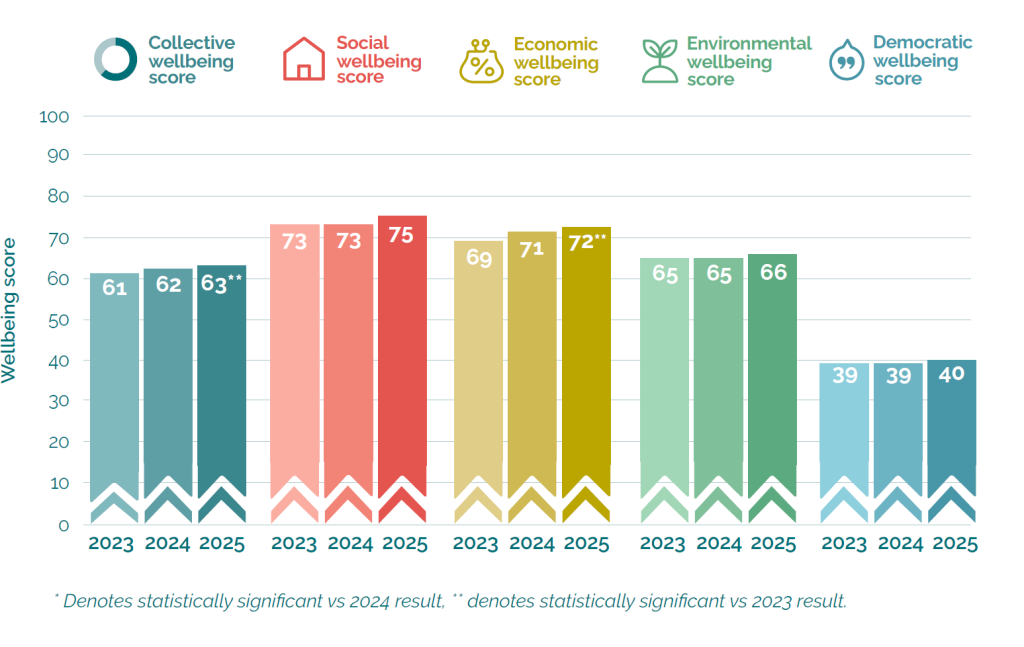
Understanding what influences collective wellbeing
This year’s results point to where change is already happening and where more work is needed to improve the wellbeing of people in Scotland. The increase to the overall collective wellbeing score indicates that there are shifts across the board, and changes in domain-level scores – especially economic wellbeing – demonstrate that slow but sure change is happening.
Collective wellbeing continues to be affected by a wide range of factors.
In 2025 the following two factors stand out as particularly significant in predicting a lower or higher collective wellbeing score:
- As the level of area deprivation worsens, collective wellbeing decreases. People living in the most deprived areas have a collective wellbeing score of 56, 12 points lower than those in the least deprived areas.
- Being disabled is strongly associated with lower wellbeing. Disabled people have a collective wellbeing score of 56, 10 points lower than people who are not disabled.
The following are also notable influences on a person’s collective wellbeing:
- Age: people over the age of 55 have a collective wellbeing score of 67, seven points higher than those aged between 16 and 34.
- Having a higher household income: Those with a household income of over £100,000 a year have a collective wellbeing score of 70, 12 points higher than those with household incomes below £26,000.
- Living in social housing: People living in social housing have a collective wellbeing score of 50, sixteen points lower than for homeowners.
- Living in a rural area: People who live in rural areas have a collective wellbeing score of 68, seven points higher than those in urban areas.
These are the same factors that were associated with higher or lower wellbeing in 2024.
Collective wellbeing map
Social wellbeing is about everyone being able to achieve their potential and contribute to society because they have basic needs met. Our basic needs include having access to health and social care, education, housing, transport, digital resources and childcare.
To determine trends in social wellbeing across Scotland, we asked questions about access to public services, community relationships, safety and community cohesion, and self-reported health and mental health.
The people most likely to experience high levels of social wellbeing in Scotland in 2025 are:
- People who live in the least deprived areas, who have a social wellbeing score of 80. This is 12 points higher than those in the most deprived areas.
- People over the age of 55, who have a social wellbeing score of 77. This is five points higher than for 16 to 34-year-olds.
- Men who have a social wellbeing score of 77. This is four points higher than women.
In contrast, the people who are likely to experience low levels of social wellbeing in Scotland are:
- People who rent from the council or housing association, who have a social wellbeing score of 61. This is 17 points lower than for homeowners.
- Disabled people, who have a social wellbeing score of 63. This is 16 points lower than people who are not disabled.

Social wellbeing – standout statistics
Several social wellbeing statistics have improved in 2025, while others have remained stable.
- 70% say that it is easy to access public transport that can get them where they need to go, six percentage points higher than in 2023.
- 65% of people say they are in good mental health, seven percentage points higher than in 2023.
- 39% of people in Scotland experienced discrimination in the last 12 months, similar to previous years but five percentage points lower than the UK average.
Social wellbeing summary
The social wellbeing of people in Scotland is now 75 out of 100. This score has not changed in a statistically significant way since Life in the UK first reported in 2023, but it remains significantly higher than the UK average.
However there remain disparities amongst demographic groups related to clear inequalities in society. On average, those living in the least deprived areas; those aged over 55; and men all have higher levels of social wellbeing. Those living in the most deprived areas, those living in social housing, and disabled people have some of the worst levels of social wellbeing in Scotland in 2025.
Social wellbeing requires everyone within a society to feel that they are a valued part of their community, and improving people’s social wellbeing brings many benefits, both to individuals and collectively. But to achieve this, the systems we live in must be designed to be fair and accessible for everyone within them and must be able to accommodate communities’ unique makeups and needs.
The small improvements seen in 2025, and the fact that Scotland has a higher social wellbeing score than the UK overall, both suggest that there are some things going right in Scotland, but there is still a long way to go.
Economic wellbeing in Scotland 2025
Scotland scores 72 out of a possible 100 for economic wellbeing.
Economic wellbeing means that everyone has a decent minimum living standard and can absorb financial shocks. This includes access to a decent income, affordability, financial resilience, job opportunities and skills.
To determine trends in economic wellbeing across Scotland, we asked questions about skills and job availability, and the affordability of essential items like food and fuel.
The people most likely to experience high economic wellbeing in Scotland in 2025 are:
- People with a household income of above £100,000, who have an economic wellbeing score of 85. This is 26 points higher than those with a household income of below £26,000 (59). Those with a household income of between £26,000 and £51,999 have an economic wellbeing score of 73, and those with a household income of £52,000 to £99,999 have an economic wellbeing score of 80.
In contrast, the people who are likely to experience low economic wellbeing are in Scotland are:
- People who rent from a council or housing association, who have an economic wellbeing score of 48. This is 20 points lower than those who rent privately (68), and 30 points lower than homeowners (78).
- Disabled people, who have an economic wellbeing score of 62. This is 14 points lower than those who are not disabled (76).
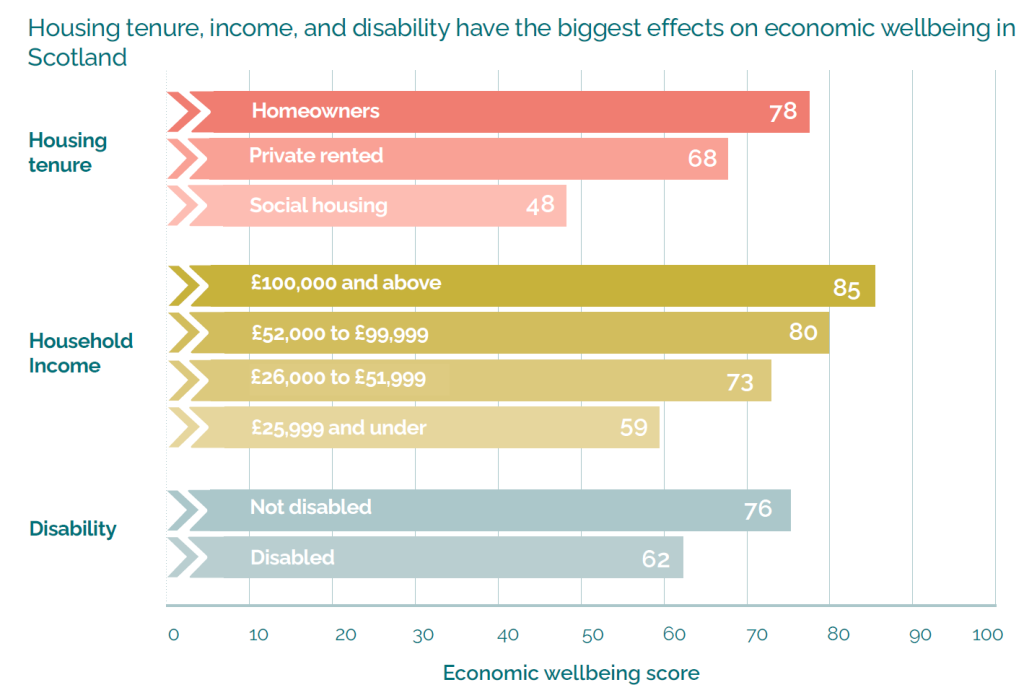
Economic wellbeing – standout statistics
Small improvements can be seen in the economic wellbeing of people in Scotland across the range of indicators.
- 81% of people can afford to heat their home to an adequate standard, nine percentage points higher than in 2023.
- 81% are satisfied with their education and skills, four percentage points higher than in 2023.
- 19% are unable to afford a week’s annual holiday away from home, five percentage points lower than in 2023.
Economic wellbeing summary
The economic wellbeing of people in Scotland has improved significantly since 2023, increasing by three points to 72. This is a welcome and hopeful change that creates a strong foundation for further progress.
Across the board, people are finding it easier to afford to heat their homes to an adequate standard and fewer people cannot afford a week’s holiday. Both of these are positive and welcome changes over time.
However, as with the other domains we still see inequalities between those who have higher and lower levels of economic wellbeing. Unsurprisingly, higher economic wellbeing correlates with higher income, but other factors also have a significant effect, with disabled people and those in social housing having the lowest levels of economic wellbeing.
The changes in economic wellbeing show that, for many, managing finances in 2025 is a little easier than it was in 2023 but, this is not true for everyone.
Environmental wellbeing in Scotland 2025
Scotland scores 66 out of a possible 100 for environmental wellbeing.
Environmental wellbeing means that everyone has access to green and blue spaces and collectively we live within the planet’s natural resources, protecting the environment for future generations.
To determine trends in environmental wellbeing across Scotland, we asked questions about access to and the quality of local parks, rivers and other green and blue spaces, and about noise pollution, air pollution, and litter in local areas. We also asked about levels of satisfaction with efforts to preserve the environment.
The people most likely to experience high environmental wellbeing in Scotland in 2025 are:
- People who live in rural areas, who have an environmental wellbeing score of 77. This is 15 points higher than those living in urban areas.
- People over the age of 55, who have an environmental wellbeing score of 70. This is nine points higher than for 16- to 34-year-olds.
In contrast, the people who are likely to experience low environmental wellbeing in Scotland are:
- People who live in the most deprived areas, who have an environmental wellbeing score of 58. This is 12 points lower than for those in the least deprived areas.

Environmental wellbeing –
standout statistics
There have been small improvements, but for many in Scotland, problems with the local environment remain.
- 82% of people experience problems with litter in their neighbourhood, similar to previous years.
- 74% of people are satisfied with their local public, green, or open space, five percentage points higher than in 2023.
- 38% of people are dissatisfied with efforts to preserve the environment in the UK, although this is eight percentage points lower than in 2023. Satisfaction stands at 26%.
Environmental wellbeing summary
The environmental wellbeing of people in Scotland has remained stable with a score of 66, not significantly higher than in 2023.
Some aspects of environmental wellbeing have improved, but others have worsened, leading to stagnant scores. People are generally more satisfied with the quality of their local open, public, or green space than in 2023: indeed, while in 2023 people in Scotland were more likely than the UK average to be dissatisfied with the quality of their local environment, they are now more likely to be satisfied than the UK average.
People in Scotland are also less dissatisfied now than in previous years with efforts to preserve the environment in the UK, though satisfaction is still low at 26%. Those over the age of 55 are significantly more likely to be satisfied than average.
Unlike in previous years, being disabled is no longer a significant indicator for having lower environmental wellbeing, although age, urbanity and area deprivation continue to have an impact on this.
Environmental wellbeing should not continue to be affected so severely by postcode and age: in order to flourish we all need access to safe, welcoming spaces where we can be around nature. This is not currently happening.
Democratic wellbeing in Scotland 2025
Scotland scores 40 out of a possible 100 for democratic wellbeing.
Democratic wellbeing is about everyone having a voice in decisions made that affect them. This means having local and
national leaders who support participation, foster trust, and encourage diversity.
To understand democratic wellbeing in Scotland in 2025, we asked questions about levels of trust in local, regional and national government(s), perceptions of personal ability to influence decisions.
Democratic wellbeing once again sees the lowest score out of any domain. While still chronically low, the people most likely to experience high democratic wellbeing in Scotland are:
- People living in the least deprived areas, who have a democratic wellbeing score of 43, eight points higher than those in the most deprived areas.
In contrast, those who are likely to experience low democratic wellbeing in Scotland are:
- Disabled people, who have a democratic wellbeing score of 35. This is six points lower than those who are not disabled.
- People aged between 16 and 34, who have a democratic wellbeing score of 36. This is six points lower than for those aged over 55.
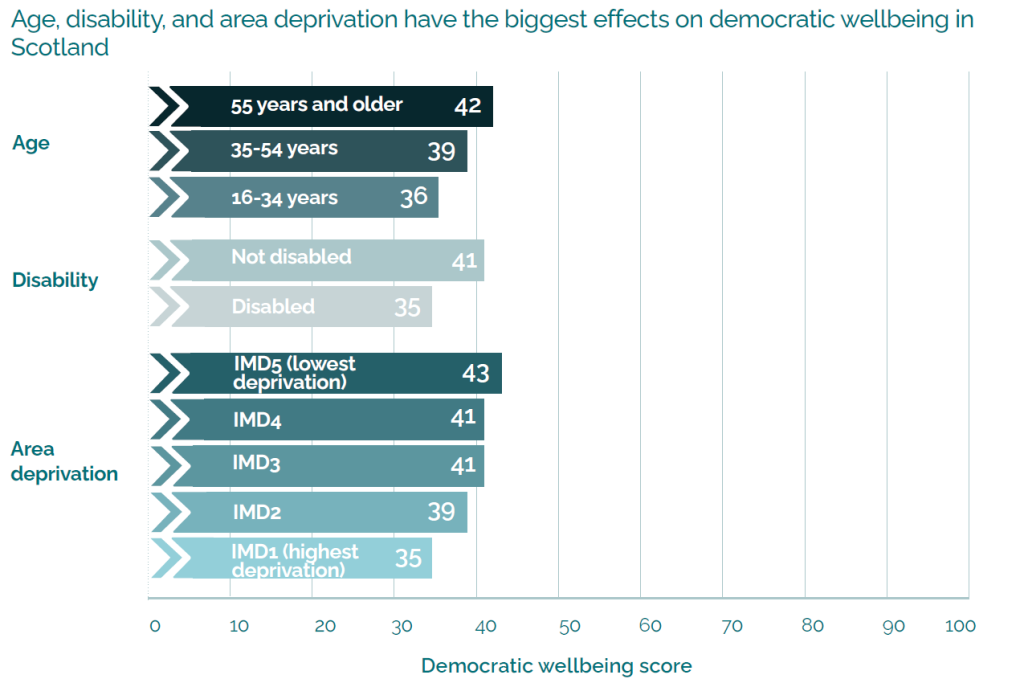
Democratic wellbeing – standout statistics
Trust in the UK Government has improved, but trust in other institutions is declining.
- 52% of people have low trust in the UK Government. This is an improvement of eight percentage points since last year, although it remains significantly higher than the UK average of 45%.
- 34% of people now have low trust in their local council, six percentage points higher than in 2023.
- Similar to previous years, only 5% of people feel that they can influence decisions affecting the UK, while 13% feel they can influence decisions affecting Scotland.
- 36% have low trust in the Scottish Government. This has not changed over the years.
Democratic wellbeing summary
The democratic wellbeing of people in Scotland has remained incredibly low at 40 out of 100 and democratic wellbeing in Scotland has not increased in line with the improvements seen this year in England.
In common with the rest of the UK, fewer people in Scotland say they have low trust in the UK Government than in 2024. High trust, while still low at 5%, is markedly higher than it was in 2023.
The Scottish Government continues to be more trusted than the UK Government, with people more than twice as likely to have high trust in the Scottish Government than the UK Government. More than a third (36%) have low trust in the Scottish Government, but this is significantly lower than the 52% who have low trust in the UK Government. However, unlike for the UK government there have been no significant improvements in trust in the devolved government.
While trust in the UK government has improved and trust in the devolved government remains unchanged, trust in local councils is deteriorating; just over a third (34%) of people in Scotland report low trust in their local council, six percentage points higher than in 2023.
More than a third (36%) of people also have low trust in the news media and more than two in five (43%) have low trust in big tech companies, while just over three in five (61%) have low trust in social media. While in the UK as a whole, trust in the news media has improved slightly since 2023 and trust in big tech companies and social media have both worsened, there have been no significant shifts in trust in these institutions in Scotland.
However, trust in the police, banks, and legal systems remains stable and is much higher than is seen elsewhere: fewer than one in five people have low trust in each of these institutions, and around a quarter say that they have high trust in each of them.
Get in touch
Want to chat about Life in the UK 2025 Scotland? Get in touch with Susan.
Help us make the case for wellbeing policy
Keep in touch with Carnegie UK’s research and activities. Learn more about ways to get involved with our work.
"*" indicates required fields

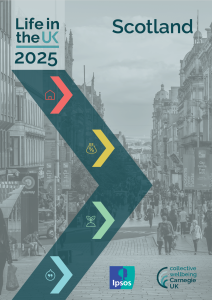
Social wellbeing in Scotland 2025
Scotland scores 75 out of a possible 100 for social wellbeing.